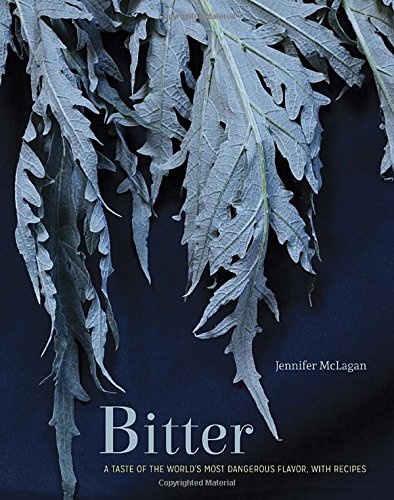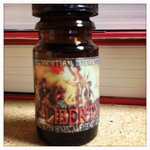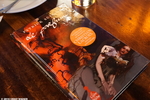New Book on a Least Liked Flavour: Bitter {Fragrant Readings} {Fragrant Recipes & Taste Notes}

If currently sweetness in perfumery has become so popular as to give birth to a mega gourmand-fragrance movement - and maybe the reverse happened too - it might be a good idea to cultivate its reverse side, bitterness, by reading a new book entitled Bitter: A Taste of the World's Most Dangerous Flavour, with Recipes...
Author Jennifer McLagan has a predilection and curiosity for discarded or reviled aspects of the food culture. She's also written three other books whose titles are Fat, Bones and Odd Bits - the latter about those pieces of meat which are considered borderline edible by some cultures while others embrace them and know how to prepare them.
The starting point of her book was her realization that grapefruit had lost its natural bitterness over the decades as it's been cultivated more and more to yield sweetness. What an incredible parallel with perfumery, you could note. She writes,
This book began with a conversation about grapefruit, and how in the past they were bitter. My friend Laura, also a cookbook author, and I were lamenting the changes wrought to this wonderful fruit by marketing boards and the North American sweet tooth. When was the last time you tasted a proper bitter grapefruit with white flesh? For me, it has been years. The grapefruit of my childhood have been replaced with pink, sweet ones. Yes, today's grapefruit still has some acidity, but it has lost its bitterness and as a result is a fruit much less interesting to eat.
It is always a good idea for perfumistas, I think, to cultivate openness of mind and more concretely speaking to do so thanks to cuisine since taste and scent are intimately linked.
One might appreciate bitter notes in fragrances better thanks to this kind of background and we might see more of those in perfumes as a result since perfumers at some level are also influenced by taste experiences. There are not very many bitter perfumes.
Off the top of my head, I would point out to absinthe-based perfumes like Absolument Absinthe, or benefiting from more unknown influences like in Caron Tubéreuse. There was a Thierry Mugler Angel with Bitter Cocoa but I do not recall it as being really bitter; Miller Harris Figue Amère is mostly bitter in name rather than on skin.
Going back to grapefruit, the bitterer grapefruit perfume I know of is Guerlain Pamplelune although I see it more as a sulphur, Thiol-laden scent.
It is telling that a perfume named Poison by Dior is one of the sweetest to be experienced in perfumery with its honey and plum accents as really it seems perfumery prefers to flirt with the idea of danger rather than start experiencing it. Bitterness is challenging.
What we learn from a summary of the book by the author is that she found out that bitterness is a sensation which is very much more complex than you might think initially,
And taste is only one of our senses that indicate bitterness. Smell, temperature, color, texture, and how the food feels in our mouth all relay a sense of bitterness to our brain. The pungency of arugula and horseradish can evoke a taste of bitter, as can the astringency that you find in celery, or the tannins in tea and cooked apricots. These sensations are delivered not through our taste buds, but via our somatosensory system, which includes touch, temperature, and texture. Beyond immediate sensory input are a whole range of cultural, environmental, experiential, and genetic factors that play a role in our perception of bitterness. The food's visual impact is very important, as is anything we have heard or read about it. These factors set up expectations about a food, so that we often dislike something even without tasting it because of how it looks, or how we think it will taste. What I find mildly bitter can be extremely bitter for others, just as the rutabaga that tastes bitter to me tastes sweet to many of my friends.
The book is published by Ten Speed Press (16 septembre 2014). 272 pages.









